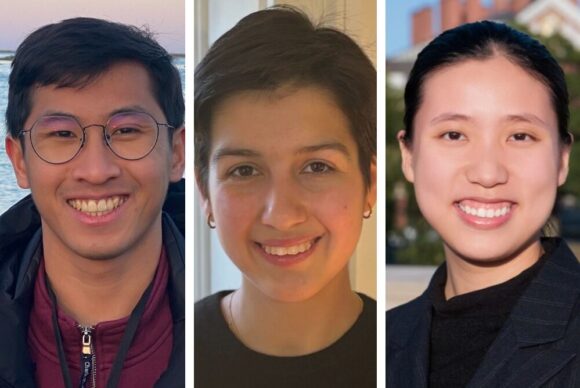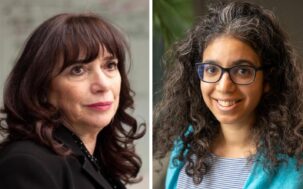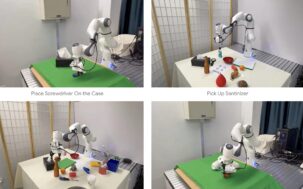Three Kempner Undergraduates Awarded 2026 Rhodes Scholarships
Kempner community members Jay Chooi, Emma Finn and Helen He are among the eight Rhodes winners from Harvard this year

Three Kempner community members have been named Rhodes Scholars for 2026. They are, from left to right, Jay Chooi, Emma Finn and Helen He.
Cambridge, MA—Three Kempner community members have been awarded prestigious Rhodes Scholarships for 2026 in recognition of their academic excellence, personal characteristics, and leadership. The scholarship provides full financial support for two to three years of graduate study at the University of Oxford.
All three students, currently seniors at Harvard College, undertook research projects at the Kempner as part of their undergraduate training. The three students are: Jay Chooi, Emma Finn, and Helen He.
About the recipients
Jay Chooi, a joint computer science and mathematics concentrator who will also earn a master’s in statistics this spring, joined the Kempner Institute in the summer of 2024, working in Sham Kakade’s lab as part of the Harvard Summer Undergraduate Research Village (HSURV) program. His research focused on in-context language learning with the goal of investigating the learning dynamics behind the prediction strategies exhibited by large language models (LLMs) when trained on a synthetic language, like Markov chains or hidden Markov models.
“[The Kempner] was a formative experience where I learned a lot from running experiments at scale on the Kempner H100 cluster… I also learned a lot about what makes or breaks research collaborations, how to do research well in a team, and other [skills] relevant to CS research that could only be gained from first-hand experience.”
Jay Chooi, 2026 Rhodes Scholarship recipient
“I am grateful for the experience and the mentorship provided at Kempner,” said Chooi. “It was a formative experience where I learned a lot from running experiments at scale on the Kempner H100 cluster, and writing custom training and monitoring scripts for LLMs,” says Chooi. “I also learned a lot about what makes or breaks research collaborations, how to do research well in a team, and other [skills] relevant to CS research that could only be gained from first-hand experience.”
At Oxford, Chooi plans to pursue the D.Phil in Computer Science, with a focus on trying to better understand AI models through interpretability and evaluations, investigate alignment and control techniques for increasingly powerful AI, and explore potential failure cases for AI. He is also interested in AI governance work.
Emma Finn, a dual concentrator in mathematics and classics who will also earn a master’s in statistics this spring, participated in the Kempner’s Fall 2025 KURE and Spring 2025 KURE undergraduate research program, and pursued intensive summer research as part of the Kempner’s 2024 KRANIUM program. She has also been a key organizer of community and educational programming at the Kempner, including the Lunch and Learn program and Boston Diffusion Day.
At Oxford, Finn will pursue an M.Sc and a D.Phil in statistics and machine learning. She plans to continue her research on understanding creativity in generative models, and is specifically interested in engaging with the vibrant AI safety community in the UK.
“I’m so grateful to my PI, the many Kempner research fellows who have mentored me, and all the friends I’ve made in this community. They have helped me understand what difference I want to make in the world and made it possible for me to start doing just that.”
Emma Finn, 2026 Rhodes Scholarship recipient
“None of this would have happened without the Kempner,” said Finn of being awarded the Rhodes. “[The Kempner’s] support, both the generosity that funded my work and the extraordinary community they’ve built, has been foundational to everything I’ve done.”
“I’m so grateful to my PI (Demba Ba), the many Kempner research fellows who have mentored me, and all the friends I’ve made in this community,” she said. “They have helped me understand what difference I want to make in the world and made it possible for me to start doing just that.”
Helen He, a joint concentrator in computer science and East Asian studies, does interdisciplinary work using technology to tell stories about human history. At Oxford, she will pursue a master’s degree in computer science, and will potentially also pursue graduate work in the philosophy, culture, and history of pre-modern and early modern China.
“KURE is where I learned how to be a better researcher – how to communicate with mentors and collaborators, how to conduct user studies, and how to communicate technical methodologies to non-technical audiences. I was lucky to have encouraging and supportive mentors. Not only did they provide spot-on technical guidance, but they are also incredibly caring about my growth and supportive of the ideas I wanted to pursue.”
Helen He, 2026 Rhodes Scholarship recipient
She participated in the inaugural KURE cohort in Spring 2024, where she got her start in computer science research working with Kempner Associate Faculty member David Alvarez-Melis and Research Fellow Naomi Saphra. She continued research with Kempner faculty and fellows for her senior thesis, which focused on reimagining medieval Chinese dance with 3D computer vision and motion reconstruction, and was advised by Kempner Research Fellow Ruojin Cai and Kempner Institute Investigator Yilun Du.
“KURE is where I started computer science research,” said He. “I am deeply grateful that KURE accepted my project proposal, which was rather “niche” – LLM heuristics for low-resource, high-similarity language pairs, including some ancient languages. This supported me in further exploring this kind of interdisciplinary research in the rest of college.”
“KURE is where I learned how to be a better researcher – how to communicate with mentors and collaborators, how to conduct user studies, and how to communicate technical methodologies to non-technical audiences (while interviewing linguists). I was lucky to have encouraging and supportive mentors. Not only did they provide spot-on technical guidance, but they are also incredibly caring about my growth and supportive of the ideas I wanted to pursue.”
Interested in research at the Kempner?
Are you a Harvard undergraduate interested in pursuing research in intelligence? Learn more about the Kempner’s term-time and summer undergraduate research programs. Applications for Spring 2026 KURE are now open through January 12, 2026.
About the Kempner
The Kempner Institute seeks to understand the basis of intelligence in natural and artificial systems by recruiting and training future generations of researchers to study intelligence from biological, cognitive, engineering, and computational perspectives. Its bold premise is that the fields of natural and artificial intelligence are intimately interconnected; the next generation of artificial intelligence (AI) will require the same principles that our brains use for fast, flexible natural reasoning, and understanding how our brains compute and reason can be elucidated by theories developed for AI. Join the Kempner mailing list to learn more, and to receive updates and news.
PRESS CONTACT:
Deborah Apsel Lang | deborah_apsel_lang[at]harvard.edu






